News & Announcements
- Details
- Written by Joshua Wachtel
Ted Wachtel's keynote from the 2011 European Congress on the Family Group Conference: Democratizing Help and Welfare in Utrecht, the Netherlands, October 19-21, 2011: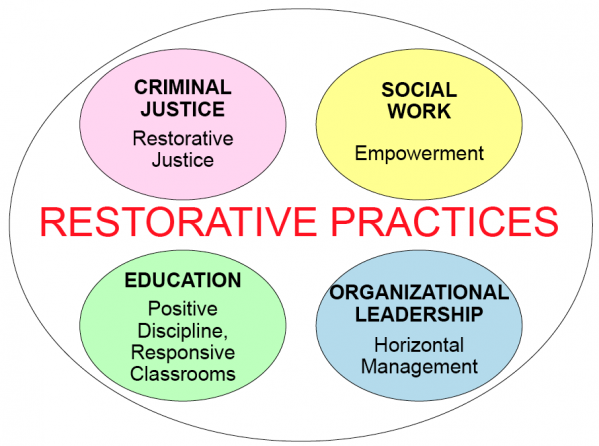
Restorative Practices: Creating a Unified Strategy for Democratizing Social Care, Education and Criminal Justice
I’d like to tell you about the first Family Group Conference story that I ever heard. I heard it in 1994 from an Australian police officer named Terry O’Connell. Terry was traveling around the world on a Winston Churchill Fellowship and he came to where I live in the U.S., in Pennsylvania. When he told this story I was deeply moved. It touched my heart. So much so that Terry said he remembered me because I was the person sitting in the front row with tears running down his cheeks.
- Details
- Written by Joshua Wachtel
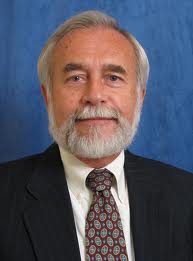 Dr. Tom Simek, IIRP Associate ProfessorIIRP Associate Professor Dr. Tom Simek contributed this piece about some changes to the IIRP's introductory courses. For those who have taken these classes, they might be interested to know about the changes. The changes will make it easier for people to get course credit and to take introductory courses if they live at a distance from the Bethlehem, Pennsylvania campus or if they participate in IIRP professional development events:
Dr. Tom Simek, IIRP Associate ProfessorIIRP Associate Professor Dr. Tom Simek contributed this piece about some changes to the IIRP's introductory courses. For those who have taken these classes, they might be interested to know about the changes. The changes will make it easier for people to get course credit and to take introductory courses if they live at a distance from the Bethlehem, Pennsylvania campus or if they participate in IIRP professional development events:
"A number of exciting changes will be taking place regarding the three introductory courses FN501, FN502, and FN503. If you have already attended both the 'Introduction to Restorative Practices' and 'Using Circles Effectively' professional development events, you can earn 1-credit tuition free by registering and completing a written reflection paper emailed to your instructor. This 1-credit course, FN501 has been renamed Basic Restorative Practices: (Part I). This is retroactive to January, 2009.
- Details
- Written by Joshua Wachtel
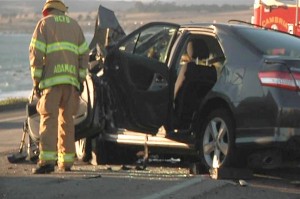 KCY CBS 12, THE MORNING CALL / October 11, 2011This heart-wrenching story involving the traffic death and serious injury to a couple from a community near IIRP's Graduate School in Bethlehem, Pennsylvania, impacts a number of IIRP employees and friends. The message conveyed by the adult children of the victims to the driver of the car that so damaged their family is astounding:
KCY CBS 12, THE MORNING CALL / October 11, 2011This heart-wrenching story involving the traffic death and serious injury to a couple from a community near IIRP's Graduate School in Bethlehem, Pennsylvania, impacts a number of IIRP employees and friends. The message conveyed by the adult children of the victims to the driver of the car that so damaged their family is astounding:
"We know you made an extremely bad decision, and we are sure it is painful for you to think about.
"God knows, we have all taken risks on the road doing far worse maneuvers without any repercussions.
- Details
- Written by Joshua Wachtel
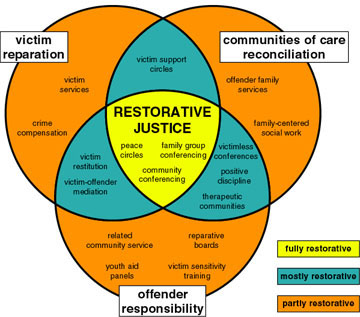 Restorative Practices TypologyHere's a visual presentation from a paper presented by Paul McCold and Ted Wachtel at the XIII World Congress of Criminology, August 10-15, 2003 in Rio de Janeiro. The chart above and text below describe how three primary stakeholders – victims, offenders and communities of care – must all be included in a process for it to be considered fully restorative. If some but not all of those stakeholders are included, the process may be partially restorative. Comments?
Restorative Practices TypologyHere's a visual presentation from a paper presented by Paul McCold and Ted Wachtel at the XIII World Congress of Criminology, August 10-15, 2003 in Rio de Janeiro. The chart above and text below describe how three primary stakeholders – victims, offenders and communities of care – must all be included in a process for it to be considered fully restorative. If some but not all of those stakeholders are included, the process may be partially restorative. Comments?
- Details
- Written by Joshua Wachtel
Finally, here in part 3 are IIRP president Ted Wachtel's brief remarks Sunday, in which he calls for a "restorative revolution." We welcome comments and discussion on this theme.
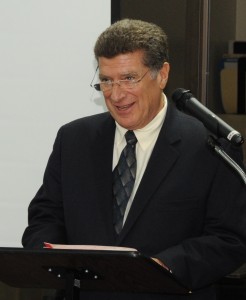 Ted Wachtel delivering remarks at IIRP accreditation celebrationThanks. Thanks to Dr. Brosnan for his kind words. Thanks to all of the staff who put together this event. And thanks to all of you for coming. I want to speak very briefly about the mission of the IIRP: to improve human behavior and civil society.
Ted Wachtel delivering remarks at IIRP accreditation celebrationThanks. Thanks to Dr. Brosnan for his kind words. Thanks to all of the staff who put together this event. And thanks to all of you for coming. I want to speak very briefly about the mission of the IIRP: to improve human behavior and civil society.
The industrial revolution of the last two centuries brought us dramatic improvements in technology and made us very powerful. But it seems that our technological skills have outpaced our social skills. We still struggle with managing conflict. And restorative practices has the potential to help.
- Details
- Written by Joshua Wachtel
Here's the second speech in this series of remarks delivered at the International Institute for Restorative Practices Accreditation Celebration, held Sunday, October 20, 2011. Joseph Brosnan, President of Delaware Valley College, spoke about IIRP and founding president Ted Wachtel's vision to change the world.
 Dr. Joseph Brosnan delivering remarks at the IIRP Accreditation CelebrationGood afternoon. I’d like to thank the International Institute for Restorative Practices for inviting me to this celebration today. I’m honored to be here. It is always a great and rare day when an institution receives its original accreditation from the Middle States Commission on Higher Education. The entire team at the IIRP deserves credit, but special thanks must go to your founder and president, an early pioneer and ceaseless advocate of restorative practices, Ted Wachtel. We are here today because of his persistence, his patience and his profound belief in an idea.
Dr. Joseph Brosnan delivering remarks at the IIRP Accreditation CelebrationGood afternoon. I’d like to thank the International Institute for Restorative Practices for inviting me to this celebration today. I’m honored to be here. It is always a great and rare day when an institution receives its original accreditation from the Middle States Commission on Higher Education. The entire team at the IIRP deserves credit, but special thanks must go to your founder and president, an early pioneer and ceaseless advocate of restorative practices, Ted Wachtel. We are here today because of his persistence, his patience and his profound belief in an idea.
- Details
- Written by Joshua Wachtel
 On Sunday afternoon, October 16, 2011 the International Institute for Restorative Practices hosted a celebration at its Bethlehem, Pennsylvania campus to acknowledge its accreditation by the Middle States Commission on Higher Education. The event was attended by students, faculty, alumni, administration, board members and friends of IIRP, and underwritten by Grim, Biehn and Thatcher law offices.
On Sunday afternoon, October 16, 2011 the International Institute for Restorative Practices hosted a celebration at its Bethlehem, Pennsylvania campus to acknowledge its accreditation by the Middle States Commission on Higher Education. The event was attended by students, faculty, alumni, administration, board members and friends of IIRP, and underwritten by Grim, Biehn and Thatcher law offices.
Over the next three days I'll be posting the speeches that were delivered Sunday, starting today with remarks by 2010 alumna, Sharon Mast:
- Details
- Written by Joshua Wachtel
As a followup to the other day's post about the Forgiveness and Apology Web Site, I'm posting this guest blog from Lorenn Walker about her experience facilitating a mediated dialog for television program Confrontation on Oprah Winfrey Network. Walker's post deals with the aspect of forgiveness in restorative processes like this one. You can read more at Lorenn Walker's blog here.
Remembering Bob Shapel at a Walla Walla Prison Restorative Dialogue
by Lorenn Walker, October 13, 2011
In January 2011 I was asked to work with three people to facilitate a restorative dialogue (a.k.a. victim offender mediation) at Walla Walla prison in Washington State. The dialogue was filmed for Confronting on the Oprah Winfrey Network.
Colleen Shapel’s husband Bob, who was also her best friend for most of her life, was senselessly murdered in a February 2004 robbery. Melissa, Colleen’s oldest daughter, and William Schorr, a co-defendant who plead guilty to the murder, also participated in the restorative dialogue (another defendant who was determined to be most responsible for the murder refused to participate).
- Details
- Written by Joshua Wachtel
 Journalist Robert KoehlerUpdate: This column, which quotes IIRP President Ted Wachtel, was also picked up by the Huffington Post.
Journalist Robert KoehlerUpdate: This column, which quotes IIRP President Ted Wachtel, was also picked up by the Huffington Post.
Award-winning Chicago-based journalist and nationally syndicated writer Robert Koehler posted this story at CommonDreams.org, discussing the need for restorative practices to deal with serious violence in schools.
Two years ago, Chicago’s Fenger High School had its 15 minutes of horrific fame when the beating death of one of its students, an honor student named Derrion Albert — waiting for a bus after school, caught suddenly in a surge of gang violence, savagely beaten with two-by-fours and railroad ties — was recorded on someone’s cell camera and became an international spectacle.
- Details
- Written by Joshua Wachtel
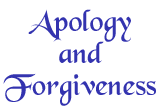 Here's a unique web site created by Lorenn Walker of Hawaii and Ben Furman of Finland. The web site was originally designed to help you create an apology letter. It now has three other features to "Help me imagine a healing dialogue with someone I've hurt," "Help me forgive someone who's hurt me," and "Help me heal and recover from a difficult or traumatic life experience."
Here's a unique web site created by Lorenn Walker of Hawaii and Ben Furman of Finland. The web site was originally designed to help you create an apology letter. It now has three other features to "Help me imagine a healing dialogue with someone I've hurt," "Help me forgive someone who's hurt me," and "Help me heal and recover from a difficult or traumatic life experience."
As the creators of the site explain below, the user is guided through a series of questions – which might as easily be asked by a counselor or therapist – that explore various aspects of empathy, healing and forgiveness. The questions provide an opportunity to reflection and then put the answers together in a way that helps someone see how they might go about apologizing to someone or finding forgiveness.
Watch the video below and try out Apology and Forgiveness web site at http://www.apologyletter.org/

Restorative Works Year in Review 2024 (PDF)
All our donors are acknowledged annually in Restorative Works.
